Annotated Bibliography and Nursing Recommendations for Heart Failure
VerifiedAdded on 2022/09/11
|6
|2688
|11
Annotated Bibliography
AI Summary
This assignment presents an annotated bibliography focused on heart failure, encompassing three research articles selected for their relevance to evidence-based nursing practice. The first part provides concise summaries and evaluations of the chosen articles, highlighting their key findings and methodologies. The second part offers a detailed justification for the selection of these articles, explaining their significance in the context of patient care and clinical decision-making. Finally, the third part delivers practical recommendations for patient management, including assessment strategies, pharmacological interventions, and lifestyle modifications. The assignment emphasizes the importance of understanding patient perceptions, implementing systematic clinical approaches, and promoting self-care strategies to improve outcomes for individuals with heart failure. The nursing recommendations include assessing vital signs, administering antihypertensives, reviewing ECG reports, monitoring electrolytes, and providing health education and psychological support.
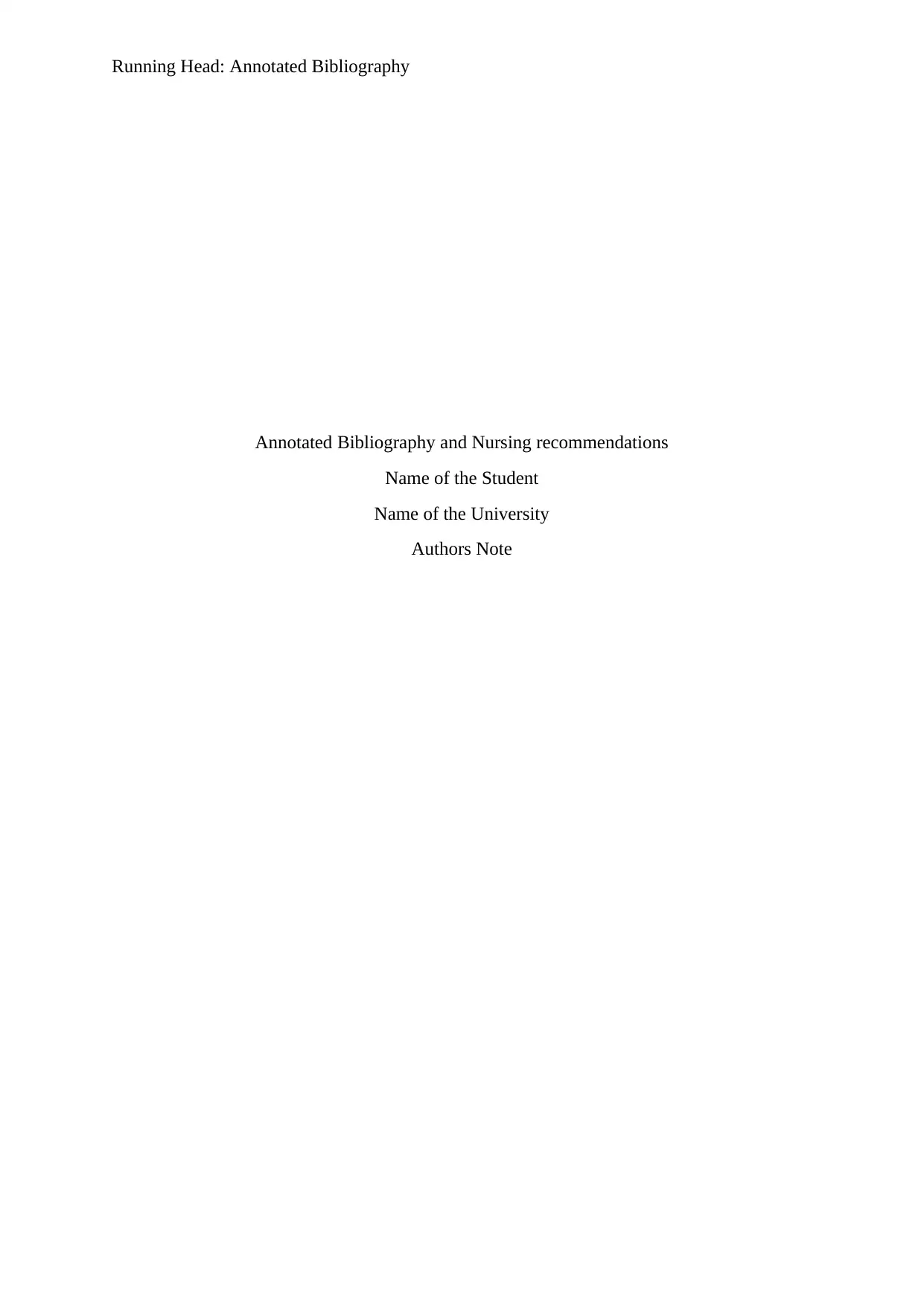
Running Head: Annotated Bibliography
Annotated Bibliography and Nursing recommendations
Name of the Student
Name of the University
Authors Note
Annotated Bibliography and Nursing recommendations
Name of the Student
Name of the University
Authors Note
Paraphrase This Document
Need a fresh take? Get an instant paraphrase of this document with our AI Paraphraser
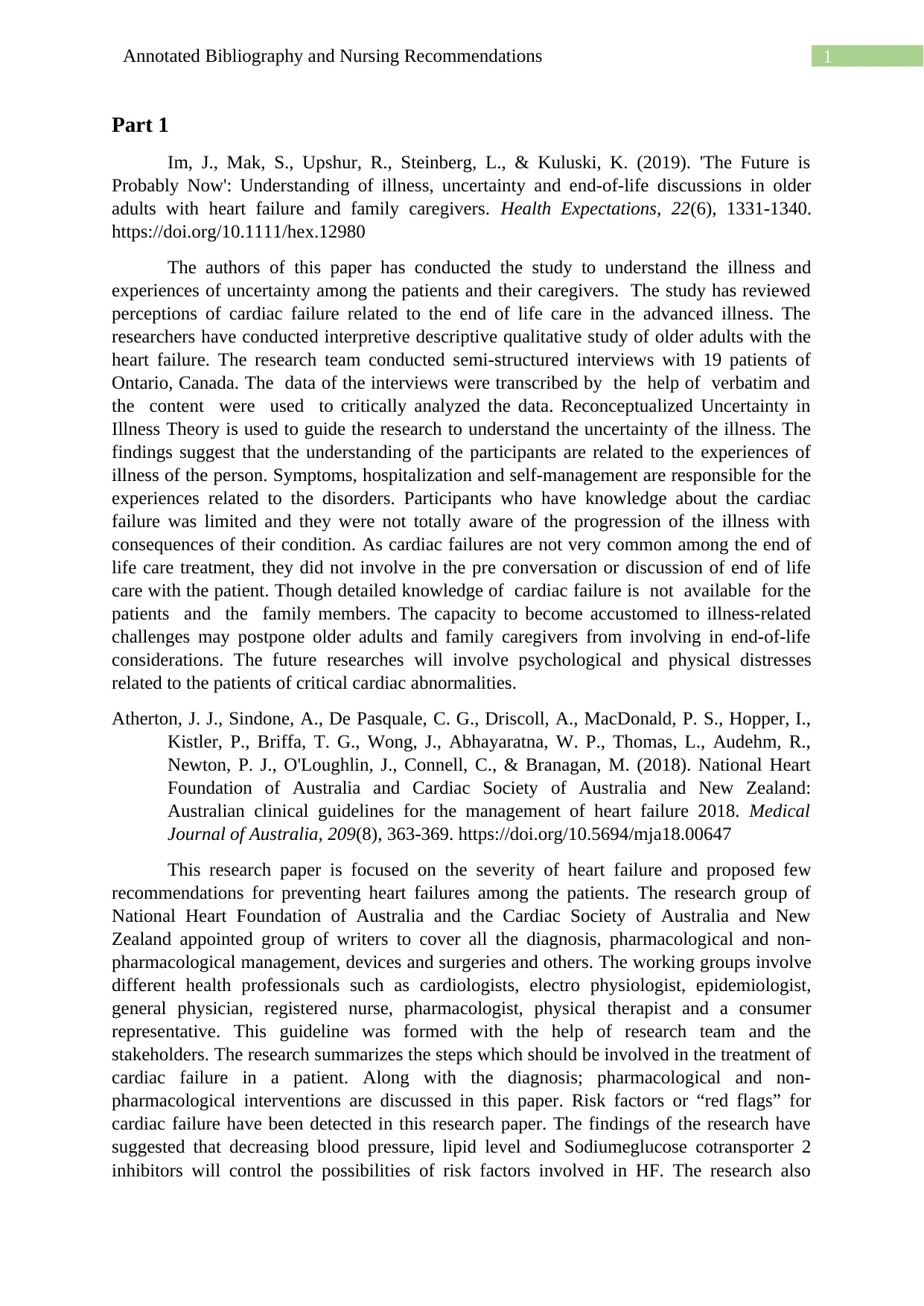
1Annotated Bibliography and Nursing Recommendations
Part 1
Im, J., Mak, S., Upshur, R., Steinberg, L., & Kuluski, K. (2019). 'The Future is
Probably Now': Understanding of illness, uncertainty and end‐of‐life discussions in older
adults with heart failure and family caregivers. Health Expectations, 22(6), 1331-1340.
https://doi.org/10.1111/hex.12980
The authors of this paper has conducted the study to understand the illness and
experiences of uncertainty among the patients and their caregivers. The study has reviewed
perceptions of cardiac failure related to the end of life care in the advanced illness. The
researchers have conducted interpretive descriptive qualitative study of older adults with the
heart failure. The research team conducted semi-structured interviews with 19 patients of
Ontario, Canada. The data of the interviews were transcribed by the help of verbatim and
the content were used to critically analyzed the data. Reconceptualized Uncertainty in
Illness Theory is used to guide the research to understand the uncertainty of the illness. The
findings suggest that the understanding of the participants are related to the experiences of
illness of the person. Symptoms, hospitalization and self-management are responsible for the
experiences related to the disorders. Participants who have knowledge about the cardiac
failure was limited and they were not totally aware of the progression of the illness with
consequences of their condition. As cardiac failures are not very common among the end of
life care treatment, they did not involve in the pre conversation or discussion of end of life
care with the patient. Though detailed knowledge of cardiac failure is not available for the
patients and the family members. The capacity to become accustomed to illness‐related
challenges may postpone older adults and family caregivers from involving in end‐of‐life
considerations. The future researches will involve psychological and physical distresses
related to the patients of critical cardiac abnormalities.
Atherton, J. J., Sindone, A., De Pasquale, C. G., Driscoll, A., MacDonald, P. S., Hopper, I.,
Kistler, P., Briffa, T. G., Wong, J., Abhayaratna, W. P., Thomas, L., Audehm, R.,
Newton, P. J., O'Loughlin, J., Connell, C., & Branagan, M. (2018). National Heart
Foundation of Australia and Cardiac Society of Australia and New Zealand:
Australian clinical guidelines for the management of heart failure 2018. Medical
Journal of Australia, 209(8), 363-369. https://doi.org/10.5694/mja18.00647
This research paper is focused on the severity of heart failure and proposed few
recommendations for preventing heart failures among the patients. The research group of
National Heart Foundation of Australia and the Cardiac Society of Australia and New
Zealand appointed group of writers to cover all the diagnosis, pharmacological and non-
pharmacological management, devices and surgeries and others. The working groups involve
different health professionals such as cardiologists, electro physiologist, epidemiologist,
general physician, registered nurse, pharmacologist, physical therapist and a consumer
representative. This guideline was formed with the help of research team and the
stakeholders. The research summarizes the steps which should be involved in the treatment of
cardiac failure in a patient. Along with the diagnosis; pharmacological and non-
pharmacological interventions are discussed in this paper. Risk factors or “red flags” for
cardiac failure have been detected in this research paper. The findings of the research have
suggested that decreasing blood pressure, lipid level and Sodiumeglucose cotransporter 2
inhibitors will control the possibilities of risk factors involved in HF. The research also
Part 1
Im, J., Mak, S., Upshur, R., Steinberg, L., & Kuluski, K. (2019). 'The Future is
Probably Now': Understanding of illness, uncertainty and end‐of‐life discussions in older
adults with heart failure and family caregivers. Health Expectations, 22(6), 1331-1340.
https://doi.org/10.1111/hex.12980
The authors of this paper has conducted the study to understand the illness and
experiences of uncertainty among the patients and their caregivers. The study has reviewed
perceptions of cardiac failure related to the end of life care in the advanced illness. The
researchers have conducted interpretive descriptive qualitative study of older adults with the
heart failure. The research team conducted semi-structured interviews with 19 patients of
Ontario, Canada. The data of the interviews were transcribed by the help of verbatim and
the content were used to critically analyzed the data. Reconceptualized Uncertainty in
Illness Theory is used to guide the research to understand the uncertainty of the illness. The
findings suggest that the understanding of the participants are related to the experiences of
illness of the person. Symptoms, hospitalization and self-management are responsible for the
experiences related to the disorders. Participants who have knowledge about the cardiac
failure was limited and they were not totally aware of the progression of the illness with
consequences of their condition. As cardiac failures are not very common among the end of
life care treatment, they did not involve in the pre conversation or discussion of end of life
care with the patient. Though detailed knowledge of cardiac failure is not available for the
patients and the family members. The capacity to become accustomed to illness‐related
challenges may postpone older adults and family caregivers from involving in end‐of‐life
considerations. The future researches will involve psychological and physical distresses
related to the patients of critical cardiac abnormalities.
Atherton, J. J., Sindone, A., De Pasquale, C. G., Driscoll, A., MacDonald, P. S., Hopper, I.,
Kistler, P., Briffa, T. G., Wong, J., Abhayaratna, W. P., Thomas, L., Audehm, R.,
Newton, P. J., O'Loughlin, J., Connell, C., & Branagan, M. (2018). National Heart
Foundation of Australia and Cardiac Society of Australia and New Zealand:
Australian clinical guidelines for the management of heart failure 2018. Medical
Journal of Australia, 209(8), 363-369. https://doi.org/10.5694/mja18.00647
This research paper is focused on the severity of heart failure and proposed few
recommendations for preventing heart failures among the patients. The research group of
National Heart Foundation of Australia and the Cardiac Society of Australia and New
Zealand appointed group of writers to cover all the diagnosis, pharmacological and non-
pharmacological management, devices and surgeries and others. The working groups involve
different health professionals such as cardiologists, electro physiologist, epidemiologist,
general physician, registered nurse, pharmacologist, physical therapist and a consumer
representative. This guideline was formed with the help of research team and the
stakeholders. The research summarizes the steps which should be involved in the treatment of
cardiac failure in a patient. Along with the diagnosis; pharmacological and non-
pharmacological interventions are discussed in this paper. Risk factors or “red flags” for
cardiac failure have been detected in this research paper. The findings of the research have
suggested that decreasing blood pressure, lipid level and Sodiumeglucose cotransporter 2
inhibitors will control the possibilities of risk factors involved in HF. The research also
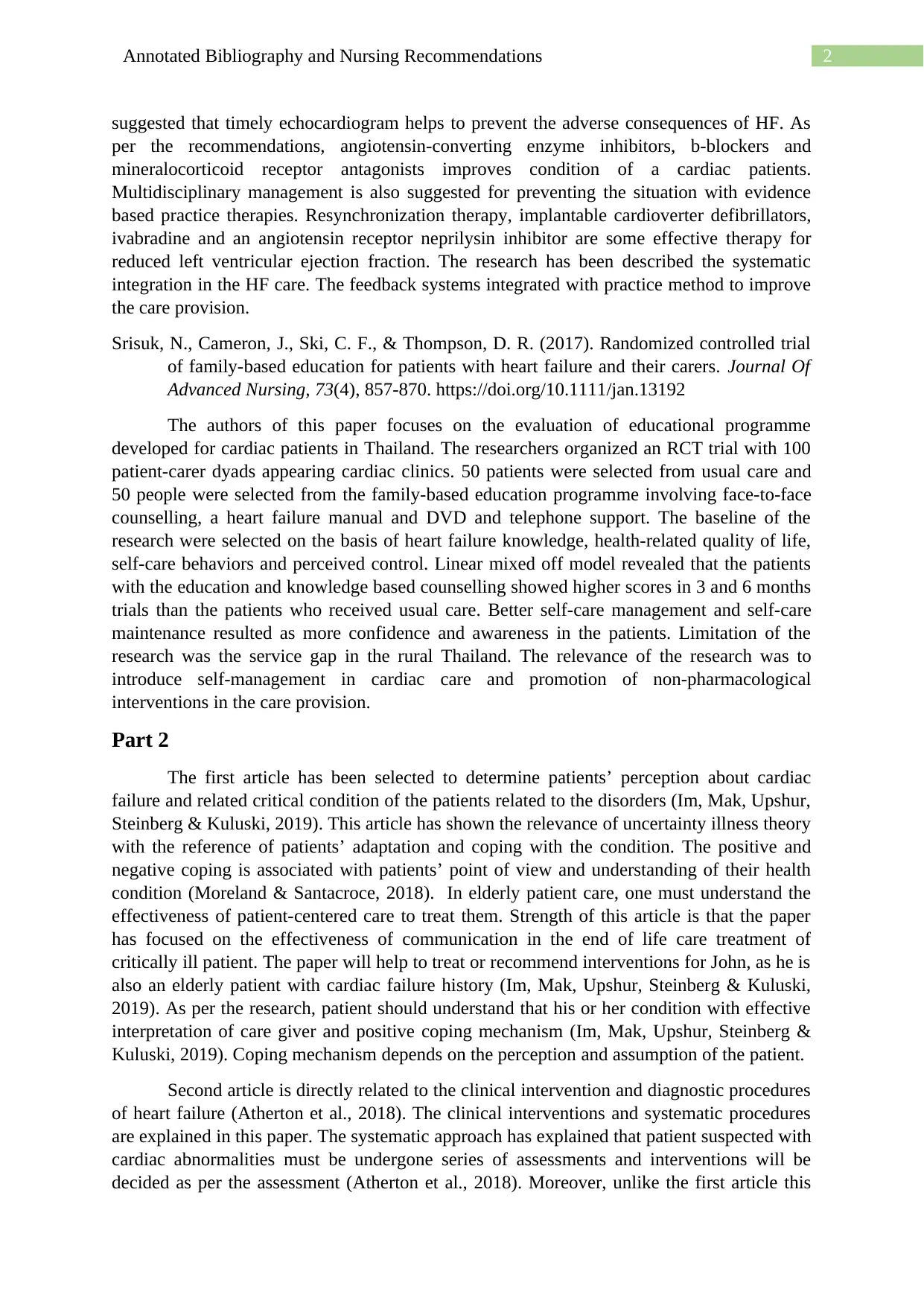
2Annotated Bibliography and Nursing Recommendations
suggested that timely echocardiogram helps to prevent the adverse consequences of HF. As
per the recommendations, angiotensin-converting enzyme inhibitors, b-blockers and
mineralocorticoid receptor antagonists improves condition of a cardiac patients.
Multidisciplinary management is also suggested for preventing the situation with evidence
based practice therapies. Resynchronization therapy, implantable cardioverter defibrillators,
ivabradine and an angiotensin receptor neprilysin inhibitor are some effective therapy for
reduced left ventricular ejection fraction. The research has been described the systematic
integration in the HF care. The feedback systems integrated with practice method to improve
the care provision.
Srisuk, N., Cameron, J., Ski, C. F., & Thompson, D. R. (2017). Randomized controlled trial
of family-based education for patients with heart failure and their carers. Journal Of
Advanced Nursing, 73(4), 857-870. https://doi.org/10.1111/jan.13192
The authors of this paper focuses on the evaluation of educational programme
developed for cardiac patients in Thailand. The researchers organized an RCT trial with 100
patient-carer dyads appearing cardiac clinics. 50 patients were selected from usual care and
50 people were selected from the family-based education programme involving face-to-face
counselling, a heart failure manual and DVD and telephone support. The baseline of the
research were selected on the basis of heart failure knowledge, health-related quality of life,
self-care behaviors and perceived control. Linear mixed off model revealed that the patients
with the education and knowledge based counselling showed higher scores in 3 and 6 months
trials than the patients who received usual care. Better self-care management and self-care
maintenance resulted as more confidence and awareness in the patients. Limitation of the
research was the service gap in the rural Thailand. The relevance of the research was to
introduce self-management in cardiac care and promotion of non-pharmacological
interventions in the care provision.
Part 2
The first article has been selected to determine patients’ perception about cardiac
failure and related critical condition of the patients related to the disorders (Im, Mak, Upshur,
Steinberg & Kuluski, 2019). This article has shown the relevance of uncertainty illness theory
with the reference of patients’ adaptation and coping with the condition. The positive and
negative coping is associated with patients’ point of view and understanding of their health
condition (Moreland & Santacroce, 2018). In elderly patient care, one must understand the
effectiveness of patient-centered care to treat them. Strength of this article is that the paper
has focused on the effectiveness of communication in the end of life care treatment of
critically ill patient. The paper will help to treat or recommend interventions for John, as he is
also an elderly patient with cardiac failure history (Im, Mak, Upshur, Steinberg & Kuluski,
2019). As per the research, patient should understand that his or her condition with effective
interpretation of care giver and positive coping mechanism (Im, Mak, Upshur, Steinberg &
Kuluski, 2019). Coping mechanism depends on the perception and assumption of the patient.
Second article is directly related to the clinical intervention and diagnostic procedures
of heart failure (Atherton et al., 2018). The clinical interventions and systematic procedures
are explained in this paper. The systematic approach has explained that patient suspected with
cardiac abnormalities must be undergone series of assessments and interventions will be
decided as per the assessment (Atherton et al., 2018). Moreover, unlike the first article this
suggested that timely echocardiogram helps to prevent the adverse consequences of HF. As
per the recommendations, angiotensin-converting enzyme inhibitors, b-blockers and
mineralocorticoid receptor antagonists improves condition of a cardiac patients.
Multidisciplinary management is also suggested for preventing the situation with evidence
based practice therapies. Resynchronization therapy, implantable cardioverter defibrillators,
ivabradine and an angiotensin receptor neprilysin inhibitor are some effective therapy for
reduced left ventricular ejection fraction. The research has been described the systematic
integration in the HF care. The feedback systems integrated with practice method to improve
the care provision.
Srisuk, N., Cameron, J., Ski, C. F., & Thompson, D. R. (2017). Randomized controlled trial
of family-based education for patients with heart failure and their carers. Journal Of
Advanced Nursing, 73(4), 857-870. https://doi.org/10.1111/jan.13192
The authors of this paper focuses on the evaluation of educational programme
developed for cardiac patients in Thailand. The researchers organized an RCT trial with 100
patient-carer dyads appearing cardiac clinics. 50 patients were selected from usual care and
50 people were selected from the family-based education programme involving face-to-face
counselling, a heart failure manual and DVD and telephone support. The baseline of the
research were selected on the basis of heart failure knowledge, health-related quality of life,
self-care behaviors and perceived control. Linear mixed off model revealed that the patients
with the education and knowledge based counselling showed higher scores in 3 and 6 months
trials than the patients who received usual care. Better self-care management and self-care
maintenance resulted as more confidence and awareness in the patients. Limitation of the
research was the service gap in the rural Thailand. The relevance of the research was to
introduce self-management in cardiac care and promotion of non-pharmacological
interventions in the care provision.
Part 2
The first article has been selected to determine patients’ perception about cardiac
failure and related critical condition of the patients related to the disorders (Im, Mak, Upshur,
Steinberg & Kuluski, 2019). This article has shown the relevance of uncertainty illness theory
with the reference of patients’ adaptation and coping with the condition. The positive and
negative coping is associated with patients’ point of view and understanding of their health
condition (Moreland & Santacroce, 2018). In elderly patient care, one must understand the
effectiveness of patient-centered care to treat them. Strength of this article is that the paper
has focused on the effectiveness of communication in the end of life care treatment of
critically ill patient. The paper will help to treat or recommend interventions for John, as he is
also an elderly patient with cardiac failure history (Im, Mak, Upshur, Steinberg & Kuluski,
2019). As per the research, patient should understand that his or her condition with effective
interpretation of care giver and positive coping mechanism (Im, Mak, Upshur, Steinberg &
Kuluski, 2019). Coping mechanism depends on the perception and assumption of the patient.
Second article is directly related to the clinical intervention and diagnostic procedures
of heart failure (Atherton et al., 2018). The clinical interventions and systematic procedures
are explained in this paper. The systematic approach has explained that patient suspected with
cardiac abnormalities must be undergone series of assessments and interventions will be
decided as per the assessment (Atherton et al., 2018). Moreover, unlike the first article this
⊘ This is a preview!⊘
Do you want full access?
Subscribe today to unlock all pages.

Trusted by 1+ million students worldwide
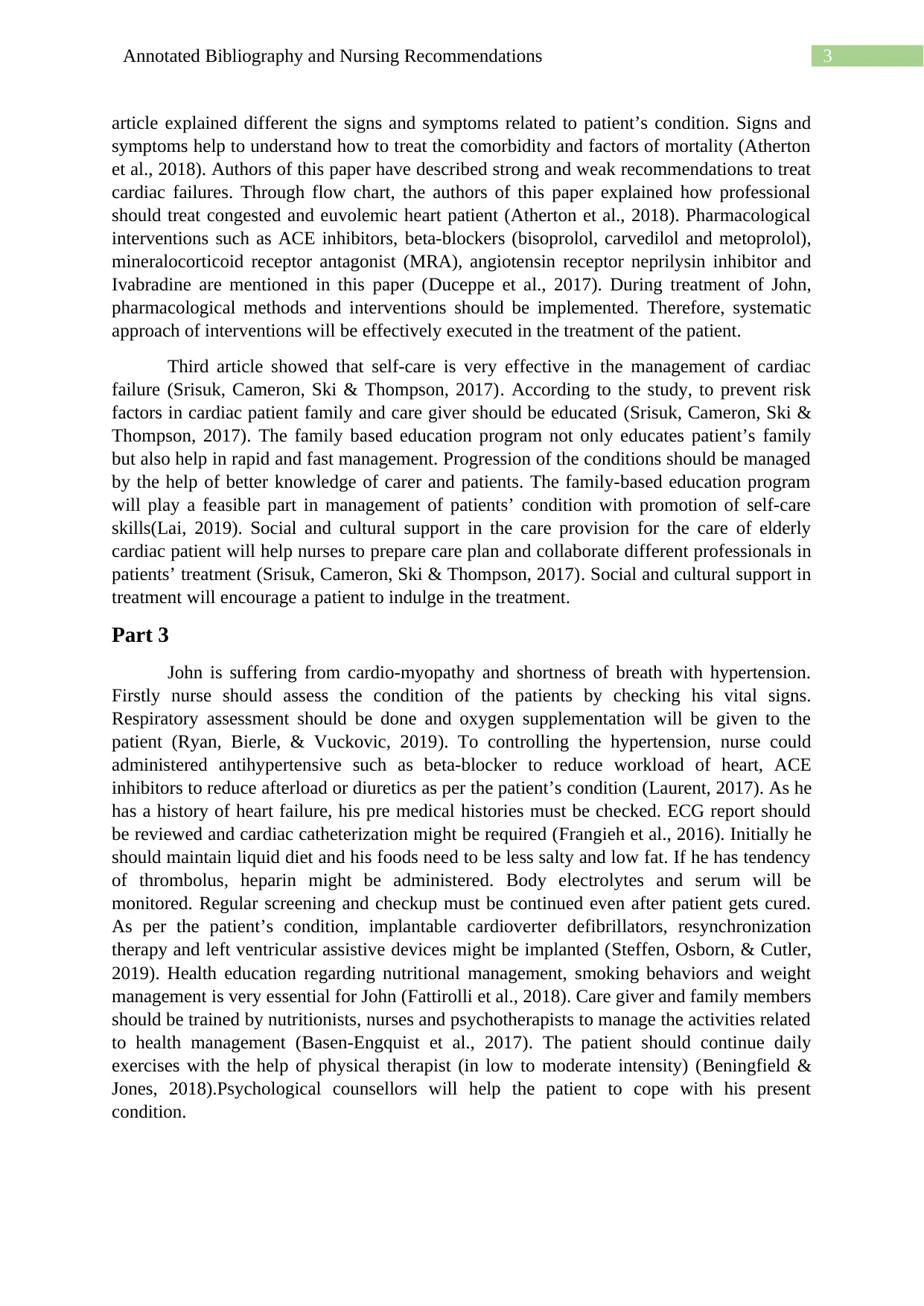
3Annotated Bibliography and Nursing Recommendations
article explained different the signs and symptoms related to patient’s condition. Signs and
symptoms help to understand how to treat the comorbidity and factors of mortality (Atherton
et al., 2018). Authors of this paper have described strong and weak recommendations to treat
cardiac failures. Through flow chart, the authors of this paper explained how professional
should treat congested and euvolemic heart patient (Atherton et al., 2018). Pharmacological
interventions such as ACE inhibitors, beta-blockers (bisoprolol, carvedilol and metoprolol),
mineralocorticoid receptor antagonist (MRA), angiotensin receptor neprilysin inhibitor and
Ivabradine are mentioned in this paper (Duceppe et al., 2017). During treatment of John,
pharmacological methods and interventions should be implemented. Therefore, systematic
approach of interventions will be effectively executed in the treatment of the patient.
Third article showed that self-care is very effective in the management of cardiac
failure (Srisuk, Cameron, Ski & Thompson, 2017). According to the study, to prevent risk
factors in cardiac patient family and care giver should be educated (Srisuk, Cameron, Ski &
Thompson, 2017). The family based education program not only educates patient’s family
but also help in rapid and fast management. Progression of the conditions should be managed
by the help of better knowledge of carer and patients. The family-based education program
will play a feasible part in management of patients’ condition with promotion of self-care
skills(Lai, 2019). Social and cultural support in the care provision for the care of elderly
cardiac patient will help nurses to prepare care plan and collaborate different professionals in
patients’ treatment (Srisuk, Cameron, Ski & Thompson, 2017). Social and cultural support in
treatment will encourage a patient to indulge in the treatment.
Part 3
John is suffering from cardio-myopathy and shortness of breath with hypertension.
Firstly nurse should assess the condition of the patients by checking his vital signs.
Respiratory assessment should be done and oxygen supplementation will be given to the
patient (Ryan, Bierle, & Vuckovic, 2019). To controlling the hypertension, nurse could
administered antihypertensive such as beta-blocker to reduce workload of heart, ACE
inhibitors to reduce afterload or diuretics as per the patient’s condition (Laurent, 2017). As he
has a history of heart failure, his pre medical histories must be checked. ECG report should
be reviewed and cardiac catheterization might be required (Frangieh et al., 2016). Initially he
should maintain liquid diet and his foods need to be less salty and low fat. If he has tendency
of thrombolus, heparin might be administered. Body electrolytes and serum will be
monitored. Regular screening and checkup must be continued even after patient gets cured.
As per the patient’s condition, implantable cardioverter defibrillators, resynchronization
therapy and left ventricular assistive devices might be implanted (Steffen, Osborn, & Cutler,
2019). Health education regarding nutritional management, smoking behaviors and weight
management is very essential for John (Fattirolli et al., 2018). Care giver and family members
should be trained by nutritionists, nurses and psychotherapists to manage the activities related
to health management (Basen‐Engquist et al., 2017). The patient should continue daily
exercises with the help of physical therapist (in low to moderate intensity) (Beningfield &
Jones, 2018).Psychological counsellors will help the patient to cope with his present
condition.
article explained different the signs and symptoms related to patient’s condition. Signs and
symptoms help to understand how to treat the comorbidity and factors of mortality (Atherton
et al., 2018). Authors of this paper have described strong and weak recommendations to treat
cardiac failures. Through flow chart, the authors of this paper explained how professional
should treat congested and euvolemic heart patient (Atherton et al., 2018). Pharmacological
interventions such as ACE inhibitors, beta-blockers (bisoprolol, carvedilol and metoprolol),
mineralocorticoid receptor antagonist (MRA), angiotensin receptor neprilysin inhibitor and
Ivabradine are mentioned in this paper (Duceppe et al., 2017). During treatment of John,
pharmacological methods and interventions should be implemented. Therefore, systematic
approach of interventions will be effectively executed in the treatment of the patient.
Third article showed that self-care is very effective in the management of cardiac
failure (Srisuk, Cameron, Ski & Thompson, 2017). According to the study, to prevent risk
factors in cardiac patient family and care giver should be educated (Srisuk, Cameron, Ski &
Thompson, 2017). The family based education program not only educates patient’s family
but also help in rapid and fast management. Progression of the conditions should be managed
by the help of better knowledge of carer and patients. The family-based education program
will play a feasible part in management of patients’ condition with promotion of self-care
skills(Lai, 2019). Social and cultural support in the care provision for the care of elderly
cardiac patient will help nurses to prepare care plan and collaborate different professionals in
patients’ treatment (Srisuk, Cameron, Ski & Thompson, 2017). Social and cultural support in
treatment will encourage a patient to indulge in the treatment.
Part 3
John is suffering from cardio-myopathy and shortness of breath with hypertension.
Firstly nurse should assess the condition of the patients by checking his vital signs.
Respiratory assessment should be done and oxygen supplementation will be given to the
patient (Ryan, Bierle, & Vuckovic, 2019). To controlling the hypertension, nurse could
administered antihypertensive such as beta-blocker to reduce workload of heart, ACE
inhibitors to reduce afterload or diuretics as per the patient’s condition (Laurent, 2017). As he
has a history of heart failure, his pre medical histories must be checked. ECG report should
be reviewed and cardiac catheterization might be required (Frangieh et al., 2016). Initially he
should maintain liquid diet and his foods need to be less salty and low fat. If he has tendency
of thrombolus, heparin might be administered. Body electrolytes and serum will be
monitored. Regular screening and checkup must be continued even after patient gets cured.
As per the patient’s condition, implantable cardioverter defibrillators, resynchronization
therapy and left ventricular assistive devices might be implanted (Steffen, Osborn, & Cutler,
2019). Health education regarding nutritional management, smoking behaviors and weight
management is very essential for John (Fattirolli et al., 2018). Care giver and family members
should be trained by nutritionists, nurses and psychotherapists to manage the activities related
to health management (Basen‐Engquist et al., 2017). The patient should continue daily
exercises with the help of physical therapist (in low to moderate intensity) (Beningfield &
Jones, 2018).Psychological counsellors will help the patient to cope with his present
condition.
Paraphrase This Document
Need a fresh take? Get an instant paraphrase of this document with our AI Paraphraser
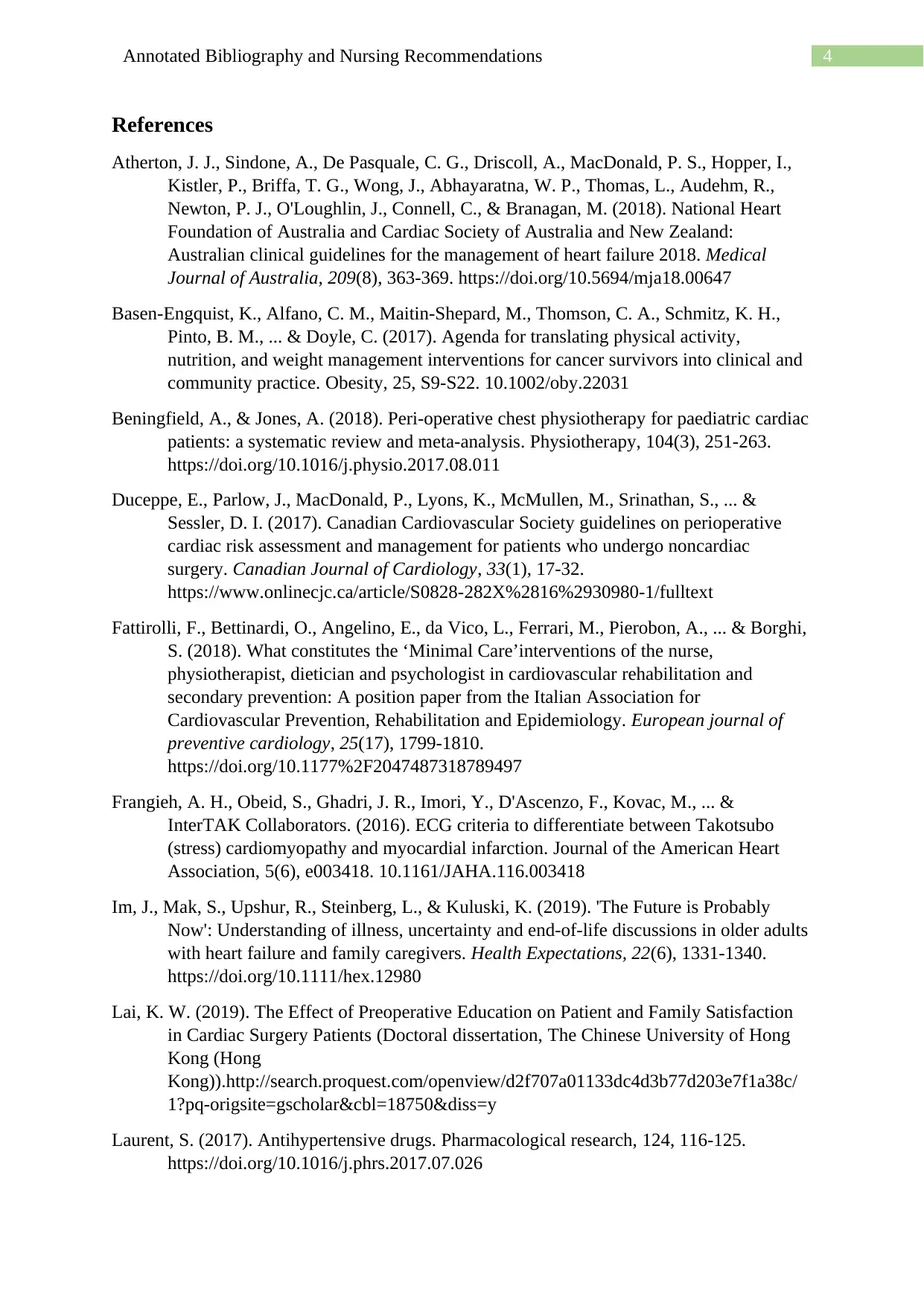
4Annotated Bibliography and Nursing Recommendations
References
Atherton, J. J., Sindone, A., De Pasquale, C. G., Driscoll, A., MacDonald, P. S., Hopper, I.,
Kistler, P., Briffa, T. G., Wong, J., Abhayaratna, W. P., Thomas, L., Audehm, R.,
Newton, P. J., O'Loughlin, J., Connell, C., & Branagan, M. (2018). National Heart
Foundation of Australia and Cardiac Society of Australia and New Zealand:
Australian clinical guidelines for the management of heart failure 2018. Medical
Journal of Australia, 209(8), 363-369. https://doi.org/10.5694/mja18.00647
Basen‐Engquist, K., Alfano, C. M., Maitin‐Shepard, M., Thomson, C. A., Schmitz, K. H.,
Pinto, B. M., ... & Doyle, C. (2017). Agenda for translating physical activity,
nutrition, and weight management interventions for cancer survivors into clinical and
community practice. Obesity, 25, S9-S22. 10.1002/oby.22031
Beningfield, A., & Jones, A. (2018). Peri-operative chest physiotherapy for paediatric cardiac
patients: a systematic review and meta-analysis. Physiotherapy, 104(3), 251-263.
https://doi.org/10.1016/j.physio.2017.08.011
Duceppe, E., Parlow, J., MacDonald, P., Lyons, K., McMullen, M., Srinathan, S., ... &
Sessler, D. I. (2017). Canadian Cardiovascular Society guidelines on perioperative
cardiac risk assessment and management for patients who undergo noncardiac
surgery. Canadian Journal of Cardiology, 33(1), 17-32.
https://www.onlinecjc.ca/article/S0828-282X%2816%2930980-1/fulltext
Fattirolli, F., Bettinardi, O., Angelino, E., da Vico, L., Ferrari, M., Pierobon, A., ... & Borghi,
S. (2018). What constitutes the ‘Minimal Care’interventions of the nurse,
physiotherapist, dietician and psychologist in cardiovascular rehabilitation and
secondary prevention: A position paper from the Italian Association for
Cardiovascular Prevention, Rehabilitation and Epidemiology. European journal of
preventive cardiology, 25(17), 1799-1810.
https://doi.org/10.1177%2F2047487318789497
Frangieh, A. H., Obeid, S., Ghadri, J. R., Imori, Y., D'Ascenzo, F., Kovac, M., ... &
InterTAK Collaborators. (2016). ECG criteria to differentiate between Takotsubo
(stress) cardiomyopathy and myocardial infarction. Journal of the American Heart
Association, 5(6), e003418. 10.1161/JAHA.116.003418
Im, J., Mak, S., Upshur, R., Steinberg, L., & Kuluski, K. (2019). 'The Future is Probably
Now': Understanding of illness, uncertainty and end‐of‐life discussions in older adults
with heart failure and family caregivers. Health Expectations, 22(6), 1331-1340.
https://doi.org/10.1111/hex.12980
Lai, K. W. (2019). The Effect of Preoperative Education on Patient and Family Satisfaction
in Cardiac Surgery Patients (Doctoral dissertation, The Chinese University of Hong
Kong (Hong
Kong)).http://search.proquest.com/openview/d2f707a01133dc4d3b77d203e7f1a38c/
1?pq-origsite=gscholar&cbl=18750&diss=y
Laurent, S. (2017). Antihypertensive drugs. Pharmacological research, 124, 116-125.
https://doi.org/10.1016/j.phrs.2017.07.026
References
Atherton, J. J., Sindone, A., De Pasquale, C. G., Driscoll, A., MacDonald, P. S., Hopper, I.,
Kistler, P., Briffa, T. G., Wong, J., Abhayaratna, W. P., Thomas, L., Audehm, R.,
Newton, P. J., O'Loughlin, J., Connell, C., & Branagan, M. (2018). National Heart
Foundation of Australia and Cardiac Society of Australia and New Zealand:
Australian clinical guidelines for the management of heart failure 2018. Medical
Journal of Australia, 209(8), 363-369. https://doi.org/10.5694/mja18.00647
Basen‐Engquist, K., Alfano, C. M., Maitin‐Shepard, M., Thomson, C. A., Schmitz, K. H.,
Pinto, B. M., ... & Doyle, C. (2017). Agenda for translating physical activity,
nutrition, and weight management interventions for cancer survivors into clinical and
community practice. Obesity, 25, S9-S22. 10.1002/oby.22031
Beningfield, A., & Jones, A. (2018). Peri-operative chest physiotherapy for paediatric cardiac
patients: a systematic review and meta-analysis. Physiotherapy, 104(3), 251-263.
https://doi.org/10.1016/j.physio.2017.08.011
Duceppe, E., Parlow, J., MacDonald, P., Lyons, K., McMullen, M., Srinathan, S., ... &
Sessler, D. I. (2017). Canadian Cardiovascular Society guidelines on perioperative
cardiac risk assessment and management for patients who undergo noncardiac
surgery. Canadian Journal of Cardiology, 33(1), 17-32.
https://www.onlinecjc.ca/article/S0828-282X%2816%2930980-1/fulltext
Fattirolli, F., Bettinardi, O., Angelino, E., da Vico, L., Ferrari, M., Pierobon, A., ... & Borghi,
S. (2018). What constitutes the ‘Minimal Care’interventions of the nurse,
physiotherapist, dietician and psychologist in cardiovascular rehabilitation and
secondary prevention: A position paper from the Italian Association for
Cardiovascular Prevention, Rehabilitation and Epidemiology. European journal of
preventive cardiology, 25(17), 1799-1810.
https://doi.org/10.1177%2F2047487318789497
Frangieh, A. H., Obeid, S., Ghadri, J. R., Imori, Y., D'Ascenzo, F., Kovac, M., ... &
InterTAK Collaborators. (2016). ECG criteria to differentiate between Takotsubo
(stress) cardiomyopathy and myocardial infarction. Journal of the American Heart
Association, 5(6), e003418. 10.1161/JAHA.116.003418
Im, J., Mak, S., Upshur, R., Steinberg, L., & Kuluski, K. (2019). 'The Future is Probably
Now': Understanding of illness, uncertainty and end‐of‐life discussions in older adults
with heart failure and family caregivers. Health Expectations, 22(6), 1331-1340.
https://doi.org/10.1111/hex.12980
Lai, K. W. (2019). The Effect of Preoperative Education on Patient and Family Satisfaction
in Cardiac Surgery Patients (Doctoral dissertation, The Chinese University of Hong
Kong (Hong
Kong)).http://search.proquest.com/openview/d2f707a01133dc4d3b77d203e7f1a38c/
1?pq-origsite=gscholar&cbl=18750&diss=y
Laurent, S. (2017). Antihypertensive drugs. Pharmacological research, 124, 116-125.
https://doi.org/10.1016/j.phrs.2017.07.026
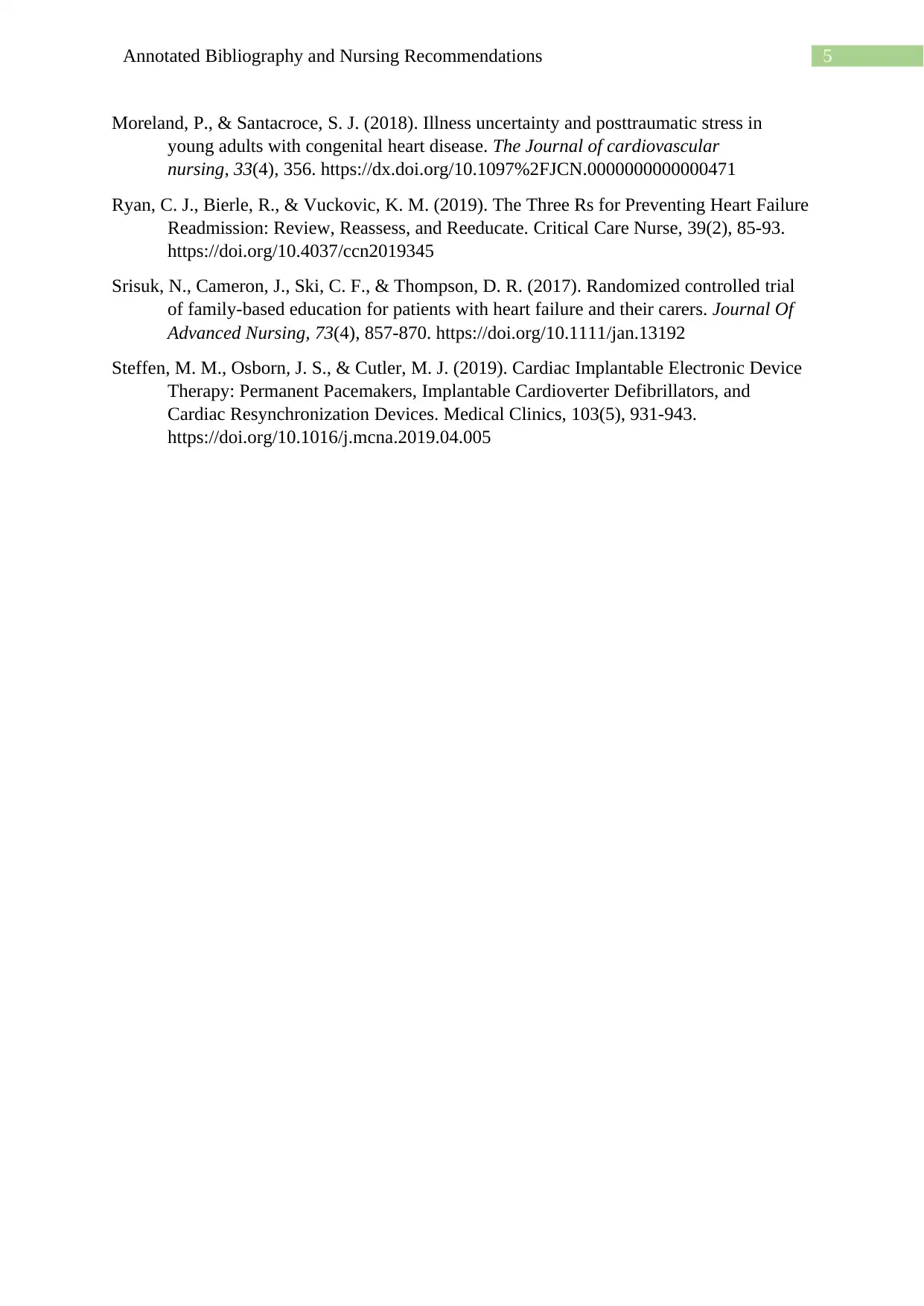
5Annotated Bibliography and Nursing Recommendations
Moreland, P., & Santacroce, S. J. (2018). Illness uncertainty and posttraumatic stress in
young adults with congenital heart disease. The Journal of cardiovascular
nursing, 33(4), 356. https://dx.doi.org/10.1097%2FJCN.0000000000000471
Ryan, C. J., Bierle, R., & Vuckovic, K. M. (2019). The Three Rs for Preventing Heart Failure
Readmission: Review, Reassess, and Reeducate. Critical Care Nurse, 39(2), 85-93.
https://doi.org/10.4037/ccn2019345
Srisuk, N., Cameron, J., Ski, C. F., & Thompson, D. R. (2017). Randomized controlled trial
of family-based education for patients with heart failure and their carers. Journal Of
Advanced Nursing, 73(4), 857-870. https://doi.org/10.1111/jan.13192
Steffen, M. M., Osborn, J. S., & Cutler, M. J. (2019). Cardiac Implantable Electronic Device
Therapy: Permanent Pacemakers, Implantable Cardioverter Defibrillators, and
Cardiac Resynchronization Devices. Medical Clinics, 103(5), 931-943.
https://doi.org/10.1016/j.mcna.2019.04.005
Moreland, P., & Santacroce, S. J. (2018). Illness uncertainty and posttraumatic stress in
young adults with congenital heart disease. The Journal of cardiovascular
nursing, 33(4), 356. https://dx.doi.org/10.1097%2FJCN.0000000000000471
Ryan, C. J., Bierle, R., & Vuckovic, K. M. (2019). The Three Rs for Preventing Heart Failure
Readmission: Review, Reassess, and Reeducate. Critical Care Nurse, 39(2), 85-93.
https://doi.org/10.4037/ccn2019345
Srisuk, N., Cameron, J., Ski, C. F., & Thompson, D. R. (2017). Randomized controlled trial
of family-based education for patients with heart failure and their carers. Journal Of
Advanced Nursing, 73(4), 857-870. https://doi.org/10.1111/jan.13192
Steffen, M. M., Osborn, J. S., & Cutler, M. J. (2019). Cardiac Implantable Electronic Device
Therapy: Permanent Pacemakers, Implantable Cardioverter Defibrillators, and
Cardiac Resynchronization Devices. Medical Clinics, 103(5), 931-943.
https://doi.org/10.1016/j.mcna.2019.04.005
⊘ This is a preview!⊘
Do you want full access?
Subscribe today to unlock all pages.

Trusted by 1+ million students worldwide
1 out of 6
Related Documents
Your All-in-One AI-Powered Toolkit for Academic Success.
+13062052269
info@desklib.com
Available 24*7 on WhatsApp / Email
![[object Object]](/_next/static/media/star-bottom.7253800d.svg)
Unlock your academic potential
Copyright © 2020–2026 A2Z Services. All Rights Reserved. Developed and managed by ZUCOL.





